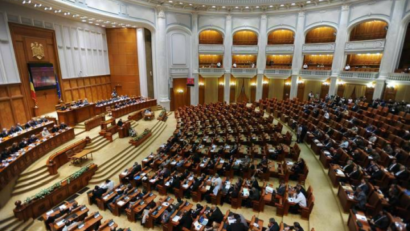Explanations regarding the salary scheme
New salary and social contribution laws spark discontent in Romania.

Roxana Vasile, 07.02.2018, 13:37
The unitary salary
law and the law under which the obligation to pay the contributions to the
social security fund was transferred from employers to employees have triggered
a genuine tsunami. Although the government, formed by the Social Democratic
Party and its junior partner the Alliance of Liberals and Democrats, says that
the two laws have corrected major dysfunctions in the system, which will lead
to salary increases for some, but also decreases for others, trade unions say
it’s all lies and manipulation.
In a much-awaited
press conference on Tuesday, the Labour Minister Lia Olguta Vasilescu said
that, when the salary law was adopted in June last year, the ratio between the
minimum salary and the maximum one, that of the president of the country, was 1
to 18, and the Government’s plan is to bring it to 1 to 12. Moreover, salary
adjustments were necessary, given that, for the same positions and
responsibilities, public servants were paid differently.
However, there is a
significant number of categories of public employees who have been complaining
that their salaries have dropped since the two laws came into force. The
minister, however, does not agree, stating that only the big salaries have been
cut, accounting for 3% of the state employees. Labour Minister Lia Olguta
Vasilescu:
I would like to
stress the fact that everybody knew about the 3% of the public sectors
employees whose salaries were to be cut. I, for myself, have announced that in
several interviews, but also in the parliamentary committees, where the salary
law was debated. Obviously, we would have liked not to reduce any salary in the
public sector. But, in order to observe the 1 to 12 ratio, which is the fair
one and in line with the EU legislation, salary adjustments had to be operated,
both in the case of those whose salaries were higher than that of the
president, and in the case of certain public servants, whose salaries were
twice as high as that established in the salary scheme for 2022.
The opposition
National Liberal Party is intent on filing a simple no-confidence motion
against the Labour Minister. The Liberal MP Dan Valceanu believes that Lia
Olguta Vasilescu has avoided speaking about the real effects of the decisions
made by the Government. Dan Valceanu:
What the minister did was to merely read from the
text of the law, without telling us what’s going to happen to court clerks,
police officers, employees of the county statistics offices, the teachers who
are paid by the hour or other categories of employees who are now in a
situation in which they have to pay the state for the work they do, and not the
other way round. I hear the minister telling us things about pensions,
forgetting to mention, for instance, that pensioners have not actually seen
their pensions rise on January 1st, as they should have been. Also,
she told us that there’s nothing they can do about the private sector. I myself
did not understand anything she said, what I heard was a reading from the text
of the law and what she said in the end, namely that people should read the
law.
If we look at how much of the state budget went to
salaries, we see that the sums are considerable, namely 57 billion lei in 2016,
70 billion in 2017 and an expected 80 billion in 2018. According to the
government, this shows that Romanians’ salaries will grow significantly.






























